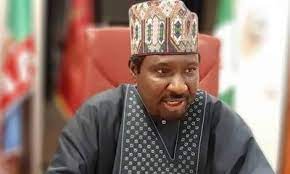Ezrel Tabiowo in this piece looks at the recent intervention by the National Assembly and how same can assist the military in its fight to end insurgency
The National Assembly in May, 2014, while approving the request of President Goodluck Jonathan seeking an extension of state of emergency declared on Adamawa, Borno, and Yobe states last year, resolved that the security chiefs brief both the senate and House of representatives on their operations within the north east region aimed at stopping insurgent activities of Boko Haram which has led to the occupation of some communities in the affected states recently.
But recall that some senators of northern extraction had kicked against the President’s request for further extension of state of emergency on the three north east states during consideration on the floor.
The lawmakers had insisted instead on proper funding of the military, one that would ensure the procurement of sophisticated fire power and equipment needed to match those used by members of the insurgent group.
The call for funding of the military later led to President Jonathan seeking the approval of the National Assembly for a $1billion loan meant for the fight against Boko Haram.
However, the outcome of the resolution reached by both chambers making it mandatory for security chiefs to brief it on military operations in the north east necessitated an emergency meeting which held two weeks ago at the National Assembly between security chiefs and the joint committee of the senate and house on Defence.
The essence of the meeting was for the National Assembly to get appraised on why the military had failed to restrain the activities of Boko Haram which had subsequently led to the capture of Bama, Gwoza and some other communities, and to possibly extend its hands of intervention in ensuring the military gets all necessary support in the fight to rid the country of insurgent activities.
During the meeting, a member of the Senate Committee on Army and Defence, Senator Mohammed Sani Saleh blamed the inability of the Nigerian military in defeating Boko Haram on what he described as the “deterioration” and “decay” in the armed forces.
Senator Saleh, a retired Army General who opened a can of worms on the rot in the military heaped the bulk of blame on past military regimes whom he said were responsible for disarming the armed forces and in the process rendering it weak.
Senator Saleh therefore called on his colleagues in the National Assembly to insist on a military that is well equipped just so as to ensure strong and potent armed forces.
Speaking, Senator Saleh said: “What I am going to say is based on my experience as an insider. Our duty here as senators of the federal republic transcends the extension of state of emergency. Our duty of oversight should ensure that high standards must be maintained in addition to acquiring all necessary equipments required to maintain a strong force.
“When the Chief of defense staff was appointed in January this year, the service chiefs made a categorical statement that within three months they will crush Boko haram. But unfortunately, what we are seeing is a complete deterioration of the situation, so it is incumbent on us to find out why that deterioration. We’re have heard about our soldiers mutiny, it is also out responsibility to find out why that is happening.
The lawmaker who also recounted incidents which led to the fall of the armed forces revealed further: “For us to understand why that is happening, we need to go back to the Babangida era. After the 1990 Okar coup, the federal government of Nigeria systematically and comprehensively disarmed the military.
“All the tanks, all the artillery guns were disarmed and locked up. All the aircraft were parked in Ilorin and other places, flying stopped, training stopped to ensure regime security not national security. All the good officers of the Nigerian army were hounded out of the military. And there was over concentration of power at the centre which was the army headquarters.
“Prior to that, General Officers Commanding used to have training and manouvre grants. They had the power and responsibility to train their troops and battalions and to ensure an efficient logistics and service support system. All that stopped. Everything was from Army headquarters, everything was from Air Force headquarters, everything was from Naval headquarters. The attendant result was decay. Training was no longer going on at the battalion level, soldiers lost their skills and since then, no additional military equipment was purchased for the Nigerian Army. Even things as little as machine guns were in short supply, ammunition was in short supply.”
Senator Saleh however cautioned that until concerted efforts are made by the federal government in ensuring a turn around of the situation which exists in the military, the fight against the Boko Haram sect may well be an uphill task that may prove insurmountable.
“An individual soldier’s professional skill was to be a matchman, to shoot and hit his target but can he do that if he has no ammunition? We have a duty to rebuild this army, to rebuil this armed forces, and unless we understand these basic facts, we are not going anywhere.
The lawmaker who also attributed the weakness of, and confusion within Nigeria’s military to its warfare tactic, blamed the Obasanjo regime for same and called for its immediate reversal as a strategic concept of engagement.
“Also, after some time the fighting doctrine of the Nigerian Army was changed. We were essentially british brought up. That means we knew how much materials we had, the tasks before us and so on. But along the line during the Obasanjo regime, General Obasanjo brought Americans here and our doctrine approach was change to warfare.
“I make bold to tell you that up till today nobody understands that. I know it is a strategic concept of warfare but in Nigeria we are applying it to the operational and tactical level. It has created a lot of confusion within our army.
According to him, Nigeria’s involvement in foreign operations and the kind of training we give to our soldiers for operations was a kind of defensive posture.
“You don’t kill until you are killed, you don’t attack until you are attacked. That also helped to change the orientation of some of our soldiers,” he added.
Revealing the extent of fraud within government’s military establishments, the lawmaker said: “I must mention here fraud within the ministry of defense, fraud within the military service systems themselves has contributed a lot to diminishing our fighting capability. Further to that again, we have the issue of our combat service support. Because of fraudulent activities, We monetized everything. Our supply services, our medical services are completely inefficient and are unable to support the fighting in the North East now. Right now I stand to question how our soldiers are being fed.”
Earlier, the Chief of Defense Staff, Air Marshall Alex Badeh, while briefing the Senator Thompson Sekibo led committee yesterday called on Nigerians not to loose faith in the ability of the armed forces in curbing insurgency in the country.
Briefing both committees of the House of Representatives and Senate, the Chief of Defense Staff disclosed that measures were already in place to deprive members of Boko Haram free movement within the North East states presently under state of emergency.
He said: “Since the declaration, the Armed Forces have been engaged in a sustained operations against these terrorists. In the last one month, troupes have sustained on-going offensive operations both in and outside seven division areas of operation to shape the theatre, establish fighting positions and limiting Boko Haram freedom of movement within the area of operation and as I said earlier, the chief of army staff and chief of Defense Staff have been away to the theatre since last week and are yet to be back till probably next week.
Significantly, troupes are currently carrying out unlimited offensive operations aimed at denying Boko haram freedom of action and from achieving its aim to isolate and control areas around Maiduguri.
“Additionally, the involvement of the international community which led to the establishment of the joint planning committee on the 12 of May, 2014, the initial mandate of the joint coordination and planning committee which is championed by America and Britain was the fusion of intelligence for the rescue of abducted Chibok girls but this gradually is being extended to other aspects of the operations. I want to state here that the military is highly engaged in operations in view of achieving favourable outcomes,” he added.
But inspite of the assurances given by the Chief of Defense Staff, same does not automatically wish away the areas of concerns raised by Senator Saleh, and which particularly is responsible for the decline in reputation of the Nigerian armed forces.
Against the backdrop of alleged fraud and corruption raised by Senator Saleh amongst government military establishments, particularly the Ministry of Defensce, both the Senate and House Committees must ensure that they carry out thorough oversight functions by insisting on accountability on how budgetary allocations are spent.
The National Assembly must also be alert in making sure that the $1 billion loan requested by President Jonathan for the fight against insurgency is put to use for the purpose same was meant, and not diverted into private pockets.
The committee on Defense of both chambers must above all insist on the training of military personnel and troops at the battalion level and supervise the procurement of state of the art equipment and fire power needed to engage Boko Haram and bring insurgency to its knees in the north east region



